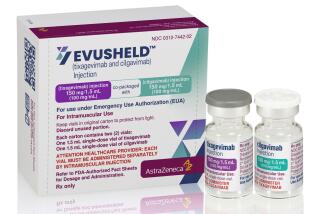Company Granted Patent to Produce Drug
- Share via
The U.S. Patent and Trademark Office on Tuesday granted Genentech Inc. a patent on a widely used method of producing biotechnology drugs for such diseases as rheumatoid arthritis and cancer.
The patent covers a fundamental method of producing therapeutic antibodies, a growing class of drugs. Genentech said the patent, issued after a decade-long legal dispute with a rival firm, is broad. “We do expect that most antibodies are covered by this patent,” said spokeswoman Sabrina Johnson.
Industry analysts poring over the 50-page patent Tuesday said they hadn’t yet assessed its effect. Thomas McGahren, an analyst with BancAmerica Securities in New York, said 90 antibody-based drugs are under development at various biotechnology companies. “This is a patent that, certainly, everyone is going to have to look at closely,” McGahren said. “It has the potential to be very important.”
The patent covers a discovery that arose from a research collaboration between Genentech and City of Hope National Medical Center in the 1980s, and applies to a method of producing antibodies that are programmed to fight specific molecules associated with disease. The Genentech drug Herceptin, for example, is a genetically engineered antibody that targets certain breast cancers.
The patent, which expires in 2018, supercedes one previously issued to Celltech Group in 1989. Genentech and the British biotechnology firm fought bitterly for ownership of the patent for years. In March, a federal court in San Francisco paved the way for Genentech when it ruled Genentech invented the technology one month before Celltech in 1983, using a draft of Genentech’s patent application to date the discovery.
Genentech and Celltech announced the settlement of their litigation Monday. Under the terms of the settlement, Genentech will license its patent, known as the Cabilly patent, to Celltech for a nominal royalty on sales of about 0.5%, according to a source familiar with the agreement. In turn, Genentech will compensate Celltech for licensing fees on products that would have been covered by its patent until 2006, the date the Celltech patent would have expired.
Genentech said that Celltech licensees will have to negotiate new royalties deals with it. Among Celltech’s licensees are New York-based ImClone Systems, which is developing a promising antibody drug for colon cancer. Bristol-Myers Squibb recently invested $1 billion in ImClone for a stake in the company and marketing rights to the still-experimental drug.
A representative of ImClone couldn’t be reached. Genentech’s Johnson said the company would review licensing applications “on a case-by-case basis.”
Genentech shares finished up 9cents at $55.10 on the New York Stock Exchange.
More to Read
Inside the business of entertainment
The Wide Shot brings you news, analysis and insights on everything from streaming wars to production — and what it all means for the future.
You may occasionally receive promotional content from the Los Angeles Times.










